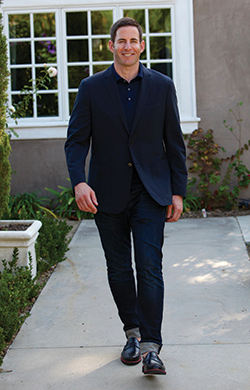Thyroid Cancer Survivor
“Flip or Flop” Star Opens Up About Two Cancer Battles
 Tightness in his throat prompted reality television personality Tarek El Moussa to see a doctor twice. No tests were performed either time, and he was assured he shouldn’t be concerned. Still, he felt something wasn’t right. Then a viewer, who was a registered nurse, contacted the producers of his hit HGTV series “Flip or Flop” to recommend he get his thyroid checked because she noticed a lump on his throat on air. He saw a new doctor the very next day, and tests led to a Stage II thyroid cancer diagnosis.
Tightness in his throat prompted reality television personality Tarek El Moussa to see a doctor twice. No tests were performed either time, and he was assured he shouldn’t be concerned. Still, he felt something wasn’t right. Then a viewer, who was a registered nurse, contacted the producers of his hit HGTV series “Flip or Flop” to recommend he get his thyroid checked because she noticed a lump on his throat on air. He saw a new doctor the very next day, and tests led to a Stage II thyroid cancer diagnosis.
Being diagnosed with thyroid cancer came as a complete surprise because I’d actually been given the “all clear” from my doctor. He attributed my cough to smoking and my constant throat clearing to allergies. When I received our viewer’s suggestion to get a thyroid check, I didn’t need to be persuaded to find a different doctor and insist on testing.
My ultrasound results were inconclusive, which can be pretty common with thyroid cancer. Rather than take a chance, we decided to do a simple procedure to remove the lobe around the lump in my throat.
The surgery wasn’t as simple as expected. My doctor ended up removing the entire thyroid and some lymph nodes. I learned that the cancer had spread to my lymph nodes, and I would need radioactive iodine therapy to kill the remaining cancer cells. Because my body was going to give off radiation during and after the treatment, I had to stay away from my wife and three-year-old daughter for about two weeks, then limit my time with them when I came home. That was rough on me, but I had to protect them from radiation exposure.
Because of the misdiagnosis, I looked back through my medical records about a month later to make sure nothing else could have been missed. I read a note in my file that said “irregular testicle exam.” And even though I wasn’t experiencing any physical changes, I followed up on it and learned I also had testicular cancer — a diagnosis completely unrelated to the first one.
I needed surgery to remove the testicle. In general, the surgeries for both cancers went fine, but the hormone issues afterward were the worst part. My hormones were way out of whack, and it really affected my mental state. Trying to figure out the medications to replace my thyroid hormone was awful. I dealt with fatigue, brain fog, depression, mood swings, anxiety and a rapid heart rate every day.
After having my testicle removed, I went to an anti-aging clinic and was prescribed testosterone to help with side effects from what they thought was low testosterone. It made all my issues worse, especially the anxiety and depression. We determined my testosterone wasn’t low, and I was basically getting double what I needed. It created what they call “roid rage,” and I felt manic and angry. It turns out the hormone issues were related to the thyroid removal. Again, I was misdiagnosed, and my natural testosterone has never recovered but I manage it through medication.
After finally working with doctors who helped me get my hormone levels straight, I feel much better overall. At first, I was constantly fatigued. It probably didn’t help that I worked up until the day of both surgeries and started back a week after, but keeping up with my regular schedule helped emotionally. I also didn’t want to cause stress to everyone around me, so I played it off like it was no big deal. I still felt physically and emotionally strong when I found out about the thyroid cancer, but dealing with two cancers at the same time was overwhelming. I was scared, and it was a very difficult time in my life.
The fatigue has remained. Some days are great and some aren’t. I struggle with the lack of energy and feel very tired all the time, but it doesn’t prevent me from doing what I need to do. I also deal with brain fog, the emotional side effects and a rapid heart rate, but I know how to manage them now.
This experience has opened my eyes to the need for greater cancer awareness and early detection. Some guys know they should check themselves for testicular cancer but they don’t really know what to check for. Learning more about cancer risk is so important. I also encourage you to get a second opinion, especially if you feel something is wrong. In fact, get as many opinions as you can. I wouldn’t have seen a doctor for a third time if that viewer hadn’t reached out about my thyroid. And, looking back, I realize that my testicle did feel different. You know your body. Trust your gut.
Today, I’m cancer-free and I feel like I’m the best version of myself. I still work hard, but nothing is more important to me than my daughter and son. My family and friends have been my biggest supporters.
Sharing my story of both cancers was difficult until I realized it might help others. Now, I get messages all the time from people who have been diagnosed with thyroid or testicular cancers. Communicating with them makes my decision to share easier and well worth it.


